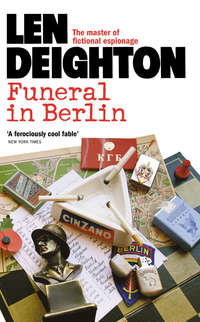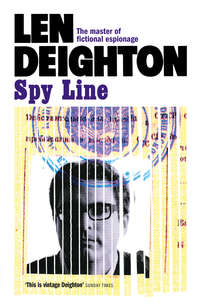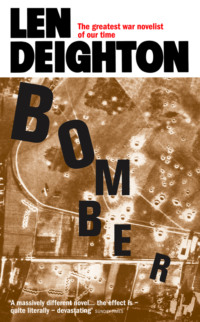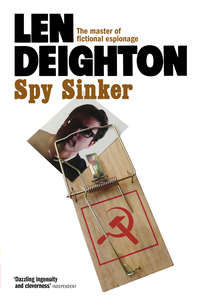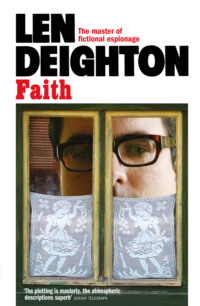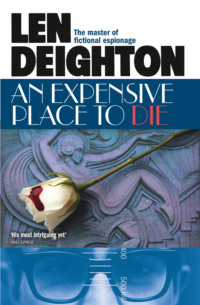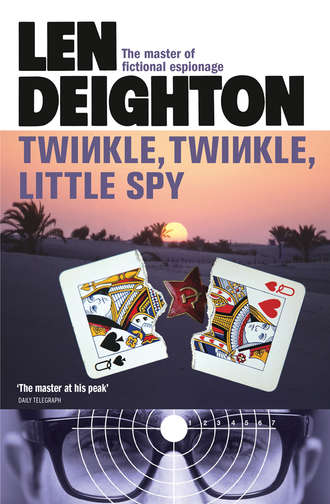
Полная версия
Twinkle Twinkle Little Spy
‘If it’s money you want,’ said the alarm manufacturer, ‘take my wallet, and welcome to it.’ He was frantically reaching into the breast pocket of his camel-hair overcoat.
The alarm manufacturer’s voice was such a plaintive whine of terror that the man with the gun smiled. He turned his head so that the third gunman could see him smiling. And then his friend smiled too.
There were two shots: deafening thumps that echoed in the narrow lobby and left behind a whiff of burned powder. The man with the gun screeched. His eyes popped wide open, he gasped and coughed blood. There was a brief moment before the pistol hit the carpet with a thump, and its owner slid slowly down the wall, leaving a long smudge of blood. Red Bancroft gripped my arm so hard that it hurt. The second shot hit the man watching the stairs. It went in at the shoulder, and smashed his clavicle. He threw his gun down and grabbed his elbow. They say that’s the only way you can ease the pain of a fractured collar-bone. He couldn’t run very fast with that sort of wound. That’s why the alarm manufacturer had time enough to put his gun up to eye level. He got him in the spine with the third shot. It was enough to tumble him full length on to scattered particles of impacted snow and the plastic sheet that had been put down in the outer lobby to protect the carpet. He died with his head resting on the word ‘Welcome’. There wasn’t much blood.
It was the body of that second man that obstructed me as I opened the glass door. It had an electric solenoid lock. I had to push the override.
The intruder alarm man collided with me in the doorway but we both scrambled out into the street in time to see the third man running. He was hatless now and halfway across the avenue. I heard a car being started. The alarm man raised his gun for a shot at him but slid on the ice and lost his balance. He tumbled. There was a clatter and a curse as he fell against a parked car. I ran out into the empty roadway. On the far side of the avenue the door of a black Mercedes opened to receive the gunman. The Mercedes leapt forward while the door was still open. I saw a flurry of arms, and one leg trailed, and cut a pattern in the snow, before the man was inside and the door closed. As the Mercedes reached the cross-street intersection, the driver switched his lights on.
‘Fulton County plate,’ said the voice of the intruder alarm man. ‘Did you see that? It was a car from Fulton County. Did you get the number?’
He was breathless from the tumble he’d taken, and I was breathless too.
‘Three digits and FC,’ I said. ‘It was too dirty to get it.’
‘Goddamned weather,’ said the man. ‘I would have plinked him but for that damned patch of ice.’ He turned and we walked back to the lobby.
‘I think you would,’ I said.
He slapped me on the back. ‘Thanks for taking his attention, young feller,’ he said.
‘Is that what I did?’
‘Raising your hands and acting scared … that took his attention. And that was cool.’ He stepped over the body that was sprawled in the doorway. I followed him.
‘Spread that around,’ I said. ‘But just between the two of us – I wasn’t acting.’
The alarm man laughed. It was the strangled sort of laugh that releases a lot of suppressed tension. He toyed with the .38 revolver that was still in his hand. It was a blue-finish Colt Agent, with the hammer shroud that prevented it from snagging when drawn from a pocket. He must have thumb-cocked the hammer, for there had been no time for double action between the movement of his hand and the sound of his shots.
‘I’d put that away,’ I said. ‘Put it out of sight before the cops arrive.’
‘I’ve got a permit,’ he said indignantly. ‘In fact, I’m president of my local gun club.’
‘They come down the street and see you standing over two corpses with a hot shooter in your hand they are likely to shoot first and check the permits afterwards.’
He put the gun away but not before bringing the next loaded chamber into position. He unbuttoned his overcoat and jacket, to place his gun into a highly decorative Berns-Martin spring-grip shoulder-holster. As we got back to the lobby Mann arrived with Tony Nowak.
‘You stupid bastard,’ said Mann to the alarm manufacturer although I had the feeling that some overfill was intended to splash on to me.
‘What am I supposed to do,’ said the alarm man, looking in a mirror and combing his hair, ‘let those punks drill me? I’d be the laughing-stock of the whole intruder alarm business.’
‘They’re both dead,’ said Mann. ‘You shot to kill.’
The alarm man turned to look at Mann. Then he looked at the two corpses and back to Mann again. For a moment I thought he was going to express satisfaction at what he’d done but he knew too much about the law to do that. ‘Well, that’s something you’d better talk about with my lawyer,’ he said finally. Some of the bubbly elation that always follows such danger was now fading, leaving him flat and a little frightened.
Mann caught my eye. ‘No, I’m getting out of here,’ he said.
‘I’m not Wyatt Earp,’ said the man. ‘I can’t shoot guns out of guys’ hands.’
I took Red Bancroft’s arm. ‘I’d better get you home,’ I said.
‘The police will want to talk to me,’ she said.
‘No. Tony will fix that,’ I said.
Tony Nowak nodded. ‘You get along home, Red. My driver will take you. And don’t lose any sleep about those guys … we’ve had a whole string of muggings here over the past month. These are rough customers. I know the Deputy Inspector – I’ll get him to keep you out of it.’
I thought the girl was taking it all with a superhuman calmness. Now I realized that she was frozen with fear. Her face was colourless and as I put my arm round her, I felt her body twitch violently. ‘Take it easy, Red,’ I said. ‘I’ll have to stay on here.’
‘They’re both dead,’ she said, and stepped high over the body of the man in the doorway, without looking down at him. Outside in the swirling snowstorm she stopped and wound her knitted scarf round her head. She reached up for me and planted a sisterly kiss on my lips. ‘Could it work out to be something special … you and me?’ she said.
‘Yes,’ I said. While we stood there a police car arrived, and then a car with a doctor’s registration.
Tony Nowak’s driver opened the door of the Lincoln for her. I waved, and stood there a long time until the car could no longer be seen. By the time I got back to the lobby the cops were there. They were stripping the dead gunmen naked, and putting the clothes into evidence bags.
5
Tony Nowak’s apartment is in the seventeenth police precinct, but dead bodies from those plush addresses go down to the Twenty-First Street Morgue and are put in the chilled drawers alongside pushers from Times Square and Chinese laundrymen from the Tenderloin.
‘Can we smoke?’ I asked the attendant. The cold room had an eerie echo. He nodded and pulled the drawer open, and read silently from the police file. Apparently satisfied, he stepped back so that we could get a good look at the hold-up man. He came out feet-first with a printed tag on his toe. His face had been cleaned of blood and his hair combed, but nothing could be done about the open mouth that made him look as if he’d died of surprise.
‘The bullet hit the windpipe,’ said the attendant. ‘He died gasping for air.’ He closed the file. ‘This has been a heavy night for us,’ he explained. ‘If it’s OK with you guys, I’ll go back to the office. Put him away when you’re through with him.’ He put the clip-board under his arm and took a look at his pocket-watch. It was 2.15 A.M. He yawned and heaved the big evidence bag on to the stainless steel table.
‘Medical examiner had them stripped at the scene of the crime – just so Forensic can’t say we lost anything.’ He prodded the transparent bag that contained a peaked hat, dark raincoat, cheap denim suit and soiled underwear. ‘You’ll find your paperwork inside.’ He twisted the identification tag that was on the dead man’s toe so that he could read from the UF6 card. ‘Died on Park Avenue, eh. Now there’s a goon with taste.’ He looked back at the body. ‘Don’t turn him over until the photographer has finished with him.’
‘OK,’ I said.
‘Your other one is in drawer number twenty-seven – we keep all the gunshot deaths together, at this end of the room. Anything else you want and I’ll be in the ME’s office through the autopsy room …’
Mann opened the bag and found the shirt. There was a bullet nick in the collar.
‘A marksman,’ I said.
‘A schmuck,’ said Mann. ‘A marksman would have been satisfied with the gun arm.’
‘You think this hold-up might have a bearing on the Bekuv situation?’ I said.
‘Put a neat litle moustache on Bekuv and send him up to Saks Fifth Avenue for a 400-dollar suit, grey his temples a little and feed him enough chocolate sodas to put a few inches on his waistline, and what have you got?’
‘Nothing,’ I said. ‘I’ve got nothing. What are you trying to say?’
‘Mister snap-shooting goddamn intruder alarm – that’s who you’ve got, stupid.’
I considered for a moment. There was a faint superficial resemblance between Bekuv and the intruder alarm man. ‘It’s not much,’ I said.
‘But it might be enough, if you were a trigger-happy gorilla, waiting in the lobby there – very nervous – and with just an ancient little snapshot of Bekuv to recognize him by.’
‘Who’d think Bekuv would be with us at Tony Nowak’s party?’
‘Greenwood and Hart: those guys wanted him there,’ said Mann.
I shook my head.
Mann said, ‘And if I told you that thirty minutes after we left Washington Square last night Andrei Bekuv was in his tux and trying to tell the doorman that I had given him permission to go out on his own?’
‘You think they got to him? You think they gave him a personal invitation to be there?’
‘He wasn’t duding-up to try his luck in the singles bars on Third Avenue,’ said Mann.
‘And you agreed?’ I asked him. ‘You told Hart and Greenwood and Nowak that you’d bring Bekuv to their party?’
‘It’s easy to be wise after the event,’ said Mann defensively. He used his tongue to find a piece of tobacco that was in his teeth. ‘Sure I agreed but I didn’t do it.’ He removed the strand of tobacco with a delicate deployment of his little finger. ‘These guys in the lobby: they didn’t ask for cash, wrist-watch or his gold tie-pin, they asked for his wallet. They wanted to check – they were nervous – they wanted to find something to prove he was really Bekuv.’
I shrugged. ‘Wallet … bill-fold … a stick-up man is likely to ask for any of these things when he wants money. What about the Fulton County number plate?’
‘Do you know how big Fulton County is?’
‘On a black Mercedes?’
‘Yes, well we’re checking it. We’ve got the guy from the Department of Motor Vehicles out of his bed, if that makes you feel any better.’
‘It does,’ I said. ‘But if we’d found that “ancient little snapshot of Bekuv” amongst these personal effects that would make me feel even better still. Until we’ve got something to go on, this remains a simple old-fashioned New York hold-up.’
‘Just a heist. But tomorrow, when we tell our pal Bekuv about it, I’m going to paint it to look like they are gunning for him.’
‘Why?’
‘We might learn something from him if he thinks he needs better protection. I’m going to tuck him away somewhere where no one’s going to find him.’
‘Where?’
‘We’ll get him out of here for Christmas, it’s too dangerous here.’
‘Miami? or the safe house in Boston?’
‘Don’t be a comedian. Send him to a CIA safe house! You might as well take a small-ad in Pravda.’ Mann rolled the body back into the chilled case. The sound set my teeth on edge. ‘You take the back-up car,’ Mann told me. ‘I’ll drive myself.’
‘Then where will you put Bekuv?’
‘Don’t make it too early in the morning.’
‘You’ve got my sworn promise,’ I said. I watched him as he marched through the rows and rows of cold slabs, his shoes clicking on the tiled floor and a curious squeaky noise that I later recognized as Mann whistling a tune.
I suppose Mann’s insouciant exit attracted the attention of the mortuary attendant. ‘What’s going on, Harry?’ He looked at me for a few seconds before realizing that I wasn’t Harry. ‘Are you the photographer?’
‘No,’ I said.
‘Then who the hell are you?’
‘Seventeenth Precinct know about me,’ I said.
‘And I’ll bet they do,’ he said. ‘How did you get in here, buster?’
‘Calm down. I saw your colleague.’
‘You saw my colleague,’ he mocked in shrill falsetto. ‘Well, now you’re seeing me.’ I noticed his hands as he repeatedly gripped his fists and released them again. I had the feeling he wanted to provoke me, so that he had an excuse for taking a poke at me. I was keen to deprive him of that excuse.
‘It’s official,’ I said.
‘ID, feller,’ he said and poked a finger at my chest.
‘He’s all right, Sammy.’ We both turned. The other mortuary attendant had come in by the centre door. ‘I talked to Charlie Kelly about him. Charlie says OK.’
‘I don’t like guys creeping around here without my permission,’ said the pugnacious little man. Still murmuring abuse, he studied his clip-board and wandered back upstairs with that twitchy walk one sees in punchy old prize-fighters.
‘Sorry about that,’ said the first attendant. ‘I should have told Sammy that you were here.’
‘I thought he was going to put me on a slab,’ I said.
‘Sammy’s all right,’ he said. He looked at me before deciding that I should have a fuller explanation. ‘Sammy and me were cops … we joined the force together, we were both wounded in a gun battle near Delancey, way back in the ’sixties. Neither of us was fit enough to go back into the force. He’s a good guy.’
‘You could have fooled me,’ I said.
‘Saw his fifteen-year-old kid brought in here one day – hit by a truck coming out of school – that happens to you once and you remember. You start getting dizzy every time you unzip a body bag.’ He turned away. ‘Anyway, it was all OK for you, was it? I hear you were right in the middle when the shells started flying.’
‘I was lucky,’ I said.
‘And the third guy took off in a black Merc.’ He was reading it all on the report. ‘You get the plate number?’
‘FC,’ I said. ‘They tell me that’s a Fulton County registration.’
‘Well, at least you didn’t get suckered by the Fulton County plate.’
‘What do you mean?’
‘Well, any cop who’s been in the force a few years will tell you the way those people from Fulton County used to come into the city and double-park all over Manhattan. And no cop would ever give them a ticket. Jesus, the number of times I saw cars … would you believe treble-parked on Madison, jamming the traffic … and I just walked on and forgot about it.’
‘I don’t get it.’
‘Well you wouldn’t, being from out of town, but a Fulton County plate is FC and then three numerals. Not many cops noticed any difference between that and three numbers followed by FC … I mean, a cop’s got a lot on his mind, without getting into that kind of pizzazz.’
‘And what is it about a car with a registration plate that has three numbers followed by FC? What is it that makes it OK for him to treble-park on Madison Avenue?’
The mortuary attendant looked at me sorrowfully. ‘Yeah, well you’ve never been a patrolman, have you. Three digits FC, means a car belonging to a foreign consul … that’s an official car with diplomatic immunity to arrest, and I mean including parking tickets. And that’s what all those smart-ass drivers from Fulton County were betting on.’
‘Got you,’ I said.
He didn’t hear me; he was staring into the ’sixties and watching one of those nice kids we all used to be. ‘Midnight to eight,’ he said. ‘I liked that shift – no dependants, so what’s the difference – and you make more money, overtime and payments for time in court. But it was a rough shift for a cop in those days.’
‘In those days?’ I said.
‘This was an all-night city back in the early ’sixties – bars open right up to the legal 4 a.m … all-night groceries, all-night dancing, all-night you-name-it. But the city got rougher and rougher, so people stayed home and watched TV … You go out there now, and the streets are dark and empty.’ He picked up a piece of cloth and wiped his hands. His hands looked very clean but he wiped them anyway. ‘Streets are so empty that a perpetrator can take his time: no witnesses, no calls to the cops, no nothing. Midnight to eight used to be a tough shift for a cop …’ He gave a humourless little laugh. ‘Now it’s a tough shift here at the morgue.’ He threw the rag aside. ‘You should see some of them when we get them here … kids and old ladies too … ahh! So you’re from out of town, eh?’
‘Yes,’ I said. ‘Three thousand miles out of town.’
‘You got it made,’ he said.
Outside the night was cold. The sky was mauve and the world slightly tilted. Around the access points for the city’s steam supply the crust of snow had melted so that the roadway shone in the moonlight, and from the manhole covers steam drifted as far as the cross-street, before the wind whipped it away. A police car siren called somewhere on the far side of the city. It was a pitiful sound, like the repeated cries of a thrashed animal crawling away to die.
6
The Washington Square house is ‘twinned’ in the CIA style – divided vertically – so that the back of the house, shuttered against telescopes and double-glazed against focusing microphones, is all offices, while the front half provides apartments for the staff, and so presents all the outward appearance of domesticity.
I lived on the second floor. Bekuv lived above me. Bekuv’s appearance had changed during those few days in New York City. His hair had been cut by some fancy barber, and he’d had enough sleep to put some colour back into his cheeks. His clothes were transformed too: tailored trousers, a blue lambswool shirt and bright canvas shoes. He was sitting on the floor, surrounded by loudspeakers, records, amplifier components, extra tweeters, a turntable, a soldering iron and hi-fi magazines. Bekuv looked despondent.
‘Andrei was screwed,’ Mann told me as I went in. I found it hard to believe that Mann was sorry about it.
‘In what way?’
‘Coffee on the warmer,’ said Bekuv.
I poured myself a cup and took a blini.
‘All this damned hi-fi junk,’ said Mann.
Bekuv applied the pick-up to one of his records and suddenly the whole room was filled with music.
‘Jesus Christ!’ Mann shouted angrily.
Delicately Bekuv lifted the pick-up and the music ceased. ‘Shostakovich,’ he said to anyone who was seeking that information.
Mann said, ‘Andrei spent nearly two thousand dollars on all this stuff, and now he’s been reading the discount-house adverts.’
‘I could have got it for five hundred dollars less,’ Bekuv told me. I noticed that several of the hi-fi magazines were marked with red pentel, and there were little sums scribbled on the back of an envelope.
‘Well, perhaps we can do something about that,’ I said vaguely, while I drank my coffee and thought about something else.
‘Andrei is not going downtown,’ said Mann, ‘and that’s that.’ I realized they had been arguing about whether Bekuv was allowed to go out on the street again.
‘Now this loudspeaker is buzzing,’ said Bekuv.
‘Listen, dummy,’ Mann told him, bending forward from his chair, so that he could speak close to Bekuv’s ear. ‘There are citizens out there waiting to ice you. Didn’t you hear what I told you about the shooting last night? We spent the small hours downtown in the city morgue – I don’t recommend it, not even for a stiff.’
‘I’m not frightened,’ said Bekuv. He put the pick-up arm back on the record. There was a loud hissing before he reduced the volume a little. It was still very loud. Mann leaned forward and lifted the pick-up off the record. ‘I don’t give a good goddamn whether you are frightened or not frightened,’ he said. ‘In fact I don’t give a damn whether you are alive or dead, but I’m going to make sure it happens after you are moved out of here, and I’ve got a receipt for you.’
‘Is that going to happen?’ asked Bekuv. He began looking through his loose-leaf notebook.
‘It might,’ said Mann.
‘I can’t go anywhere for the time being,’ said Bekuv. ‘I have work to do.’
‘What work?’ I said.
Bekuv looked at me as if only just realizing that I was present. ‘My work on interstellar communication,’ he said, sarcastically. ‘Have you forgotten that I have a chair at New York University?’
‘No,’ I said.
‘I’ve calculated for the initial programme of transmissions. It would cost very little money, and it will focus attention on the work we are doing.’
‘Transmissions?’ said Mann.
‘In space there are clouds of hydrogen. They vibrate to make a hum of radio noise. You pick it up on any radio set at 1,420 megacycles. My theory is that this would be the best frequency to use for our first messages to outer space. Other civilizations are certain to notice any change in that hum of hydrogen vibrations.’
‘Sure to,’ said Mann.
‘Not on that exact wavelength,’ added Bekuv. ‘They would be obliterated. We must transmit near to the wavelength, not on it.’
‘Near to it; not on it,’ said Mann. He nodded.
‘It would cost very little,’ said Bekuv. ‘And I could have it working inside six months.’
‘That’s well before the flying-saucer men go to summer camp,’ said Mann.
Bekuv looked up at Mann. His voice was harsh, and it was as if he was answering a long list of unspoken questions when he shouted, ‘Twice I have attended meetings of the 1924 Society. Only twice! The last time was nearly five years ago. Science is not the cosy little club you believe it is. Don’t keep pressurizing me. I recognized no one, and we did not exchange names and addresses, for obvious reasons.’
‘For obvious reasons,’ said Mann. ‘Because those sons of bitches were betraying the whole of America’s military electronics programme.’
‘And will it get your secrets back if you keep me a prisoner here?’ yelled Bekuv. ‘Not allowed to go out … Not allowed to make phone calls.’
Mann walked quickly to the door, as if frightened he would lose his temper. He turned. ‘You’ll stay here as long as I think fit,’ he said. ‘Behave yourself and I’ll send you a packet of phonograph needles and a subscription to Little Green Men Monthly.’
Bekuv spoke quietly. ‘You don’t like cosmology, you don’t like high-fidelity, you don’t like Shostakovich, you don’t like blinis …’ Bekuv smiled. I couldn’t decide whether he was trying to needle Mann or not.
‘I don’t like Russians,’ explained Mann. ‘White Russians, Red Russians, Ukrainians, Muscovite liberals, ballet dancers or faggy poets – I just don’t like any of them. Get the picture?’
‘I get it,’ said Bekuv sulkily. ‘Is there anything more?’
‘One thing more,’ said Mann. ‘I’m not an international expert on the design of electronic masers. All I know about them is that a maser is some kind of crystal gimmick that gets pumped up with electronic energy so that it amplifies the weakest of incoming radio signals. That way you get a big fat signal compared with the background of electronic static noise and interference.’
‘That’s right,’ said Bekuv. It was the first time he’d shown any real interest.
‘I was reading that your liquid helium bath technique, that keeps the maser at minus two hundred and sixty-eight degrees centigrade, will amplify a signal nearly two million times.’
Bekuv nodded.
‘Now I see the day when every little two-bit transistor could be using one of these gadgets and pulling in radio transmissions from anywhere in the world. Of course, we know that would just mean hearing a DJ spinning discs in Peking, instead of Pasadena, but a guy collecting a royalty on such a gadget could make a few million. Right, Professor?’


